- Home
- T. H. White
The Book of Merlyn Page 3
The Book of Merlyn Read online
Page 3
Later he asked quietly, as if he were calling somebody who was asleep: “Wart?”
There was no reply.
“King?”
The bitter answer was: “Le roy s’advisera.”
It was worse than he had feared. He sat down, took the limp hand, and began to wheedle.
“One more try,” he asked. “We are not quite done.”
“What is the use of trying?”
“It is a thing which people do.”
“People are dupes, then.”
The old fellow replied frankly: “People are dupes, and wicked too. That is what makes it interesting to get them better.”
His victim opened his eyes, but closed them wearily.
“The thing which you were thinking about before I came, king, was true. I mean about Homo ferox. But hawks are ferae naturae also: that is their interest.”
The eyes remained closed.
“The thing which you were thinking about… about people being machines: that was not true. Or, if it is true, it does not signify. For if we are all machines ourselves, then there are none to bother about.”
“I see.”
Curiously enough, he did see. Also his eyes came open and remained open.
“Do you remember the angel in the Bible, who was ready to spare whole cities provided that one just man could be found? Was it one? That applies to Homo ferox, Arthur, even now.”
The eyes began to watch their vision closely.
“You have been taking my advice too literally, king. To disbelieve in original sin, does not mean that you must believe in original virtue. It only means that you must not believe that people are utterly wicked. Wicked they may be, and even very wicked, but not utterly. Otherwise, I agree, it would be no use trying.”
Arthur said, with one of his sweet smiles: “This is a good dream. I hope it will be long.”
His teacher took out his spectacles, polished them, put them on his nose, and examined the old man carefully. There was a hint of satisfaction behind the lenses.
“Unless,” he said, “you had lived this, you would not have known it. One has to live one’s knowledge. How are you?”
“Fairly well. How are you?”
“Very well.”
They shook hands, as if they had just met.
“Will you be staying?”
“Actually,” replied the necromancer, now blowing his nose furiously in order to hide his glee, or perhaps to hide his contrition,” I shall hardly be here at all. I have been sent with an invitation.”
He folded his handkerchief and replaced it in his cap.
“Any mice?” asked the king with a first faint twinkle. The skin of his face twitched as it were, or tautened itself for the fraction of a second, so that you could see underneath it, in the bone perhaps, the freckled, snub-nosed countenance of a little boy who had once been charmed by Archimedes.
Merlyn took the skull-cap off indulgently.
“One,” he said. “I think it was a mouse: but it has become partly shrivelled. And here, I see, is the frog I picked up in the summer. It had been run over, poor creature, during the drought. A perfect silhouette.”
He examined it complacently before putting it back, then crossed his legs and examined his companion in the same way, nursing his knee.
“The invitation,” he said. “We were hoping you would pay us a visit. Your battle can look after itself until tomorrow, we suppose?”
“Nothing matters in a dream.”
This seemed to anger him, for he exclaimed with some vexation: “I wish you would stop about dreams! How would you like it if I were to call you a dream? You must consider other people.”
“Never mind.”
“The invitation, then. It was to visit my cave, where young Nimue put me. Do you remember her? There are some friends in it, waiting to meet you.”
“It would be beautiful.”
“Your battle is arranged, I believe, and you would hardly sleep in any case. It might cheer your heart to come.”
“Nothing is arranged,” said the king. “But dreams arrange themselves.”
At this the aged gentleman leaped from his seat, clutching his forehead as if he had been shot in it, and raised his wand of lignum vitae to the skies.
“Merciful powers! Dreams again!”
He took off his conical hat with a stately gesture, looked piercingly upon the bearded figure opposite which looked as old as he did, and banged himself on the head with his wand as a mark of exclamation. Then he sat down, half stunned, having misjudged the emphasis.
The old king watched him with a warming mind. Now that he was dreaming of his long-lost friend so vividly, he began to see why Merlyn had always clowned on purpose. It had been a means of helping people to learn in a happy way. He began to feel the greatest affection, which was even mixed with awe, for his tutor’s ancient courage: which could go on believing and trying with undaunted crankiness, in spite of ages of experience. He began to be lightened at the thought that benevolence and valour could persist. In the lightening of his heart he smiled, closed his eyes, and dropped asleep in earnest.
2
WHEN HE OPENED THEM, it was still dark. Merlyn was there, moodily scratching the greyhound’s ears and muttering. He had saved his pupil from misery before, by being nasty to him when he was a young boy called the Wart, but he knew that the poor old chap before him now had suffered too much misery for the trick to work again. The next best thing was to distract the king’s attention, he must have decided, for he set to work as soon as the eyes were open, in a way which all magicians understand. They are accustomed to palm things off on people, under a mirage of patter.
“Now,” he said. “Dreams. We must get this over for good and all. Apart from the maddening indignity of being called a dream—personally, because it muddles you—it confuses other people. How about the learned readers? And it is degrading to ourselves. When I was a third-rate schoolmaster in the twentieth century—or was it in the nineteenth—every single boy I ever met wrote essays for me which ended: Then he woke up. You could say that the Dream was the only literary convention of their most degraded classrooms. Are we to be this? We are the Matter of Britain, remember. And what of oneirocriticism, I ask? What are the psychologists to make of it? Stuff as dreams are made of is stuff and nonsense in my opinion.”
“Yes,” said the king meekly.
“Do I look like a dream?”
“Yes.”
Merlyn seemed to gasp with vexation, then put the whole beard into his mouth at one mouthful. After this he blew his nose and went away to stand in a corner, with his face to the canvas, where he began to soliloquise indignantly.
“Of all the persecutions and floutings,” he stated. “How can a necromancer prove he is not a vision, when suspected of the baseness? A ghost may prove he is alive by being pinched: but not so with a by-our-lady dream. For, argal, you can dream of pinches. Yet hist! There is the noted remedy, in which the dreamer pinches his own leg.
“Arthur,” he directed, turning round like a top, “be pleased to pinch yourself.”
“Yes.”
“Now, does this prove you are awake?”
“I doubt it.”
The vision examined him sadly.
“I was afraid it would not,” it agreed; and it returned to its corner, where it began to recite some complicated passages from Burton, Jung, Hippocrates and Sir Thomas Browne.
After five minutes, it struck its fist into the palm of the other hand and marched back to the candle light, inspired by the bed of Cleopatra.
“Listen,” Merlyn announced. “Have you ever dreamed of a smell?”
“Dreamed of a smell?”
“Do not repeat.”
“I can hardly…”
“Come, come. You have dreamed of a sight, have you not? And of a feeling: everybody has dreamed of a feeling. You may even have dreamed of a taste. I recollect that once when I had forgotten to eat anything for a fortnight, I dreamed of a chocolate pu
dding: which I distinctly tasted, but it was snatched away. The question is, have you ever dreamed of a smell?”
“I do not think I have: not to smell it.”
“Make sure. Do not stare like an idiot, my dear man, but attend to the matter in hand. Have you ever dreamed with your nose?”
“Never. I cannot remember dreaming of a smell.”
“You are positive?”
“Positive.”
“Then smell that!” cried the necromancer, snatching off his skull-cap and presenting it under Arthur’s nose, with its cargo of mice, frogs and a few shrimps for salmon-fishing which he had overlooked.
“Phew!”
“Am I a dream now?”
“It does not smell like one.”
“Well, then …”
“Merlyn,” said the king. “It makes no difference whether you are a dream or not, so long as you are here. Sit down and be patient for a little, if you can. Tell me the reason of your visit. Talk. Say you have come to save us from this war.”
The old fellow had achieved his object of artificial respiration as well as he could; so now he sat down comfortably, and took the matter in hand.
“No,” he said. “Nobody can be saved from anything, unless they save themselves. It is hopeless doing things for people—it is often very dangerous indeed to do things at all—and the only thing worth doing for the race is to increase its stock of ideas. Then, if you make available a larger stock, the people are at liberty to help themselves from out of it. By this process the means of improvement is offered, to be accepted or rejected freely, and there is a faint hope of progress in the course of the millennia. Such is the business of the philosopher, to open new ideas. It is not his business to impose them on people.”
“You did not tell me this before.”
“Why not?”
“You have egged me into doing things during all my life… The Chivalry and the Round Table which you made me invent, what were these but efforts to save people, and to get things done?”
“They were ideas,” said the philosopher firmly, “rudimentary ideas. All thought, in its early stages, begins as action. The actions which you have been wading through have been ideas, clumsy ones of course, but they had to be established as a foundation before we could begin to think in earnest. You have been teaching man to think in action. Now it is time to think in our heads.”
“So my Table was not a failure—Master?”
“Certainly not. It was an experiment. Experiments lead to new ones, and this is why I have come to take you to our burrow.”
“I am ready,” he said, amazed to find that he was feeling happy.
“The committee discovered that there had been some gaps in your education, two of them, and it was determined that these ought to be put right before concluding the active stage of the Idea.”
“What is this committee? It sounds as if they had been making a report.”
“And so we did. You will meet them presently in the cave. But now, excuse my mentioning it, there is a matter to arrange before we go.”
Here Merlyn examined his toes with a doubtful eye, hesitating to continue.
“Men’s brains,” he explained in the end, “seem to get petrified as they grow older. The surface becomes perished, like worn leather, and will no longer take impressions. You may have noticed it?”
“I feel a stiffness in my head.”
“Now children have resilient, plastic brains,” continued the magician with relish, as if he were talking about caviare sandwiches. “They can take impressions before you could say Jack Robinson. To learn a language when you are young, for instance, might literally be called child’s play: but after middle age one finds it is the devil.”
“I have heard people say so.”
“What the committee suggested was, that if you are to learn these things we speak of, you ought—ahem—you ought to be a boy. They have furnished me with a patent medicine to do it. You understand: you would become the Wart once more.”
“Not if I had to live my life again,” replied the other old fellow evenly.
They faced each other like image and object in a mirror, the outside corners of their eyes drawn down with the hooded lids of age.
“It would be only for the evening.”
“The Elixir of Life?”
“Exactly. Think of the people who have tried to find it.”
“If I were to find such a thing, I would throw it away.”
“I hope you are not being stupid about children,” asked Merlyn, looking vaguely about him. “We have high authority for being born again, like little ones. Grown-ups have developed an unpleasant habit lately, I notice, of comforting themselves for their degradation by pretending that children are childish. I trust we are free from this?”
“Everybody knows that children are more intelligent than their parents.”
“You and I know it, but the people who are going to read this book do not.
“Our readers of that time,” continued the necromancer in a grim voice, “have exactly three ideas in their magnificent noddles. The first is that the human species is superior to others. The second, that the twentieth century is superior to other centuries. And the third, that human adults of the twentieth century are superior to their young. The whole illusion may be labelled Progress, and anybody who questions it is called puerile, reactionary, or an escapist. The March of Mind, God help them.”
He considered these facts for some time, then added: “And a fourth piece of scientific clap-trap which they are to have, rejoices in the name of anthropomorphism. Even their children are supposed to be so superior to the animals that you must never mention the two creatures in the same breath. If you begin considering men as animals, they put it the other way round and say that you are considering animals as men, a sin which they hold to be worse than bigamy. Imagine a scientist being merely an animal, they say! Tut-tut, and Tilly-fol-de-rido!”
“Who are these readers?”
“The readers of the book.”
“What book?”
“The book we are in.”
“Are we in a book?”
“We had better attend to the job,” said Merlyn hastily.
He took hold of his wand, rolled up his sleeves, and fixed a tight eye on the patient. “Do you agree?” he asked.
But the old king stopped him.
“No,” he said, with a sort of firm apology. “I have earned my body and mind with many years of labour. It would be undignified to change them. I am not too proud to be a child, Merlyn, but too old. If it were my body which were to be made young, it would be unsuitable to keep an old mind in it. While, if you were to change them both, the labour of living all those years would turn to vanity. There is nothing else for it, Master. We must keep the state of life to which it has pleased God to call us.”
The magician lowered the wand.
“But your brain,” he complained. “It is like a fossilised sponge. And would you not have liked to be young, to frisk about and feel your knees again? Young people are happy, are they not? We had meant it for a pleasure.”
“It would indeed have been a pleasure, and thank you for thinking of it. But life is not invented for happiness, I do believe. It is made for something else.”
Merlyn chewed the end of his stick while he considered.
“You are right,” he said in the end. “I was against the proposal from the start. But something will have to be done to souple your intellects, for all that, or you will never catch the new idea. I suppose there would be no objection to a cerebral massage, if I could manage it? I should have to get my galvanic batteries, my extra-reds and under-violets: my french chalk and my pinches of this and that: a touch of adrenalin and a sniff of garlic. You know the kind of thing?”
“No, if you think it is right.”
He extended his hand into the ether, with a well-remembered gesture, and the apparatus began to materialise obediently: muddled up as usual.
3
; THE TREATMENT WAS UNPLEASANT. It was like having one’s hair brushed vigorously the wrong way, or like having a sprained ankle flexed by that dreadful kind of masseuse who urges people to relax. The king gripped the arms of his chair, closed his eyes, clenched his teeth and sweated. When he opened them for the second time that evening, it was on a different world.
“Good heavens!” he exclaimed, jumping to his feet. In leaving the chair he did not take his weight upon his wrists, like an old man, but upon the palms and phalanges. “Look at the dog’s hollow eyes! The candles are reflected from the back, not from the front, as if it were from the bottom of a cup. Why have I never noticed this before? And look here: there is a hole in Bathsheba’s bath, which needs darning. What is this entry in the book? Susp.?* Who has betrayed us into hanging people? Nobody deserves to be hanged. Merlyn, why is there no reflection from your eyes, when I put the candles between us? Why have I never thought about it? The light comes red from a fox, green from a cat, yellow from a horse, saffron from a dog … And look at that falcon’s beak: it has a tooth in it like a saw! Goshawks and sparrow-hawks do not have a tooth. It must be a peculiarity of falco. What an extraordinary thing a tent is! Half of it is trying to push it up, and the other half is trying to pull it down. Ex nihilo res fit.’ † And look at those chess-men! Check-mate indeed! Nay, we will try the ploy again …”
Imagine a rusty bolt on the garden door, which has been set wrong, or the door has sagged on its hinges since it was put on, and for years that bolt has never been shot efficiently: except by hammering it, or by lifting the door a little, and wriggling it home with effort. Imagine then that the old bolt is unscrewed, rubbed with emery paper, bathed in paraffin, polished with fine sand, generously oiled, and reset by a skilled workman with such nicety that it bolts and unbolts with the pressure of a finger—with the pressure of a feather—almost so that you could blow it open or shut. Can you imagine the feelings of the bolt? They are the feelings of glory which convalescent people have, after a fever. It would look forward to being bolted, yearning for the rapture of its sweet, successful motion.

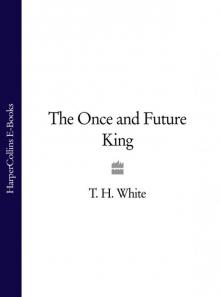 The Once and Future King (#1-4)
The Once and Future King (#1-4) Once & Future King 05 - The Book of Merlyn
Once & Future King 05 - The Book of Merlyn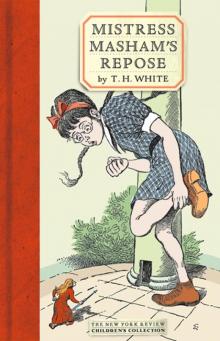 Mistress Masham's Repose
Mistress Masham's Repose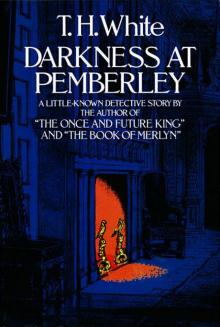 Darkness at Pemberley
Darkness at Pemberley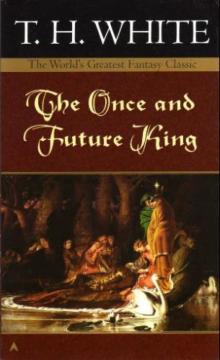 The Once and Future King
The Once and Future King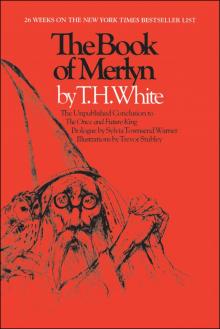 The Book of Merlyn
The Book of Merlyn Candle in the Wind
Candle in the Wind